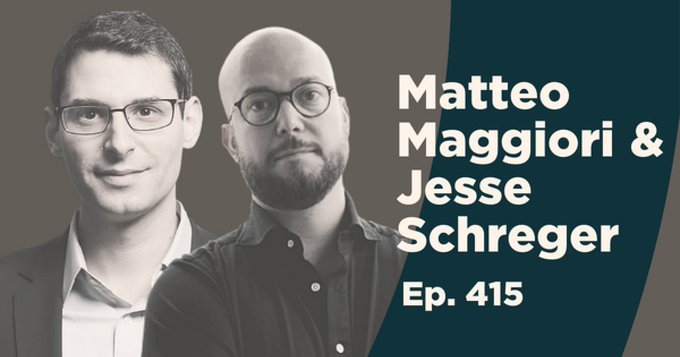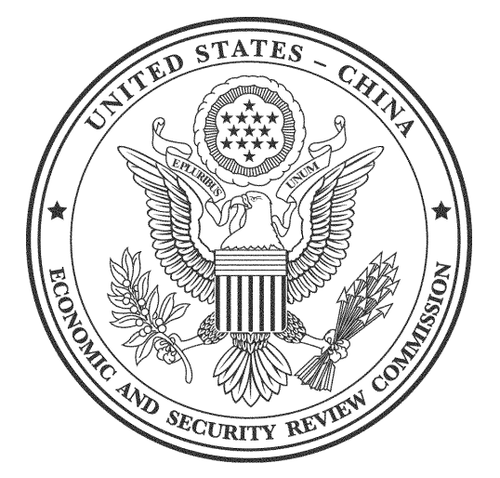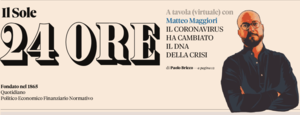Economic Times: US versus China is a clash of geoeconomic hegemons — only these two economies can effectively cajole or coerce other nations
April 9, 2025
[Jesse Schreger] ``A big question here is, how much can you ask of your own firms? In competing with China, a US concern has been limiting Beijing’s access to cutting-edge semiconductors because of the military role. So, the US enacted export controls and would try to block, say, Nvidia, from selling such semiconductors to China. But there’s a limit to how much they could ask firms to do. They’d say, ‘Here’s the threshold above which chips can’t be sent.’ Yet, a firm could appear to make a chip that was just below the threshold — it’s easy for China to combine those and still compete. One of the trade-offs the US faces now is the more it would like to limit the ability of its own firms to do business with China, the more it cuts into these companies’ profit margins. How much pain can you ask your businesses to take — particularly if they are profit-maximising entities which have a choice of where to locate? Sometimes, the cost of outward power projection is making your own economy potentially worse.”
Financial Times: How to make sense of Donald Trump’s tariffs
April 3, 2025
”Just after Trump spoke, a trio of American economists — Christopher Clayton, Matteo Maggiori and Jesse Schreger — released a paper outlining the growing field of ‘geoeconomics’, inspired by Hirschman…
This work has already produced three themes that investors should pay attention to. First, and most obviously, the trio’s analysis shows that it is dangerous for small countries to become too dependent on any large trading partner, and they offer tools to measure such vulnerability.”
The Washington Post: The 41-page blueprint that may help explain Trump’s painful trade wars
March 25, 2025
“Jesse Schreger, an economist at Columbia Business School whose work Miran cites, said the concept of a new currency accord is difficult to reconcile with the punishment Trump has inflicted on Mexico and Canada…
‘There’s a fundamental coherence to this. There is a plan laid out here. And because everyone is grasping for what is Trump doing, this is the document people are reading,’ Schreger said. ‘But the problem is it’s not what the president is implementing. There’s nothing in there that says we should start by going after Canada and Mexico. Instead, the document emphasizes building a coalition to coordinate trade efforts against China.’”
Financial times: Smaller countries learn to hedge their bets in the age of Trump
February 14th, 2025
“Indeed, this is probably the only sensible thing for most countries to do, according to the Global Capital Allocation Project (a research site on hegemonic economic power that is replete with handy charts showing which countries are most vulnerable to American and Chinese hegemonic power). Diversifying inputs, this notes, is crucial if countries are to increase “economic security” in a capricious world.”
Corriere della Sera: Big Tech e altri giganti, così l’Europa può farsi valere
January 27th, 2025
”Noi stiamo del tutto sottovalutando - è l’opinione di Matteo Maggiori, economista, docente a Stanford e cofondatore di Globalcapitalallocation.com - il costo economico dell’ossessione per la sicurezza che, a partire dagli Stati Uniti, molti Paesi hanno messo al primo posto della loro agenda. La frammentazione avrà effetti su prezzi e quote di mercato. La più grande arma di pressione degli Stati Uniti non sono però i dazi, sono i servizi finanziari di base e i sistemi di pagamento.”
Central Banking: NBER paper explores sources of ‘geoeconomic power’
January 14th, 2025
”New research outlines how a state may wield ‘geoeconomic power’ and finds important differences between the ability of democracies and autocracies to do so. The working paper, published this week by the US National Bureau of Economic Research, says there has been a ‘stunning rise’ in the willingness of nations to use trade and financial relationships for geopolitical ends.”
Financial Times: Dollar dominance means tariffs are not the only game in town
January 10th, 2025
”After all, as a new report from the Global Capital Allocation Project (a joint hub between Stanford, Chicago and Columbia universities) notes, it is China that actually has hegemonic power over global manufacturing, via its dominance of many supply chains.
Where America does have hegemonic power, however, is in finance, via the dollar-based system. Or, as the GCAP says: ‘Since the US-led coalition controls a dominant share of global financial services, often exceeding 80 or 90 per cent in many countries, this near-total control of the global financial system enables the US coalition to frequently use finance as a tool of coercion.’”
Financial Times: ‘That is Maganomics’: where Trump is taking America on trade
January 3rd 2025
”`We estimate that US geoeconomic power relies on financial services, while Chinese power relies on manufacturing,’ says Matteo Maggiori, an economist, in a new paper he has co-written on these hegemonic power politics.”
IL SOLE 24 ORE: Stati Uniti più fragili di quanto si creda sullo scacchiere (English Version)
December 24th 2024
“Gli Stati Uniti e i loro alleati controllano una quota schiacciante dei servizi finanziari globali. Questa posizione dominante rende la finanza uno degli strumenti geoeconomici più potenti a disposizione degli Stati Uniti. Tuttavia, la posizione degli Stati Uniti è più fragile di quanto comunemente si creda.”
The U.S. and its allies control an overwhelming share of global financial services, exceeding 80 or 90 percent throughout the world. This dominant position makes finance one of the most powerful geoeconomics tools available to the U.S. However, the U.S. position is more fragile than commonly understood.
Bloomberg: Tracking China's Progress in Internationalizing the Yuan
July 7th 2024
“Making the yuan a global currency is at the center of Chinese President Xi Jinping's ambition to create a ‘modern financial system with Chinese characteristics.’ That goal has faced challenges, however, including capital controls in China and the currency's limited convertibility. Matteo Maggiori, Moghadam Family Professor of Finance at Stanford Graduate School of Business, and Bloomberg Intelligence Chief Asia FX and Rates Strategist Stephen Chiu speak on ‘Bloomberg: The China Show.’”
Matteo Maggiori awarded 2024 Banque de France/TSE Junior Prize for Money and Macroeconomics
June 19th 2024
The Banque de France and the Toulouse School of Economics (TSE) awarded the 2024 Junior Prize for Money and Macroeconomics to our Co-Director Matteo Maggiori in recognition of his work on capital flows, the determinants of international currencies and their role in financial integration.
ECB USES GCAP RESEARCH FOR BIENNIAL FINANCIAL INTEGRATION REPORT
June 18th 2024
The ECB biennial report on financial integration and structure in the Euro Area uses GCAP’s research showing that integration has been lower and different than previously understood.
Full report on Financial Integration and Structure in the Euro Area
Maggiori AND Schreger join the Macromusings podcast to talk about their GEOECONOMICS research
December 4th 2023
“Maggiori and Schreger join the Macromusings podcast to talk about their GEOECONOMICS research, joint with Chris Clayton. How and why governments use their countries' economic strength from existing financial and trade relationships to achieve geopolitical and economic goals.”
THE ECONOMIST: “New industrial policies will not help economic stability”
October 2nd 2023
“I think most trade and investment relationships between America and China are best left to private decisions,” says Matteo Maggiori of Stanford University. “But it would make sense to restrict trade and investment in some highly sensitive areas, such as port infrastructure and defence.” This would reduce, though not eliminate, the potential damage that China could do if it turned truly hostile to the West. Economists including Mr Maggiori are working on models to inform politicians about which sectors should be protected, and how.”
BANCO DE ESPANA: CEREMONY of BERNACER Prize
June 20th 2023
Matteo Maggiori was awarded the Bernacer Prize. The ceremony was held at the Banco de Espana and hosted by Governor Hernandez de Cos and ECB Vice President Luis De Guindos.
VP De Guindos remarks on Maggiori's research contributions
A panel with Maggiori and ECB Chief Economist Philip Lane: video
Financial Services Committee on “International Financial Institutions in an Era of Great Power Competition”
May 25th 2023
Jesse Schreger testifies before the House Financial Services Committee Subcommittee on National Security, Illicit Finance, and International Financial Institutions on the "International Financial Institutions in an Age of Great Power Rivalry."
REUTERS: “DEBT CEILING DEBACLE IS ULTIMATE WINNER’S CURSE”
May 23rd 2023
“A study by the Global Capital Allocation Project examined corporate bond holdings where issuer and buyer were in different countries, and found that the share denominated in U.S. dollars has grown since the financial crisis, from roughly 40% to over 60%. The euro share has slumped.”
Econofact Chats: “How Much of Your Investments Are in China?"
April 11th 2023
“Matteo's podcast with EconoFact on investment in China both onshore and offshore, home currency bias, and China's attempts to internationalize its currency. An overview of broad themes in international macroeconomics as well as GCAP research.”
the New york times: “Chinese companies are doing risky business in the caribbean
March 8th 2023
"China wasn’t a big presence there. As recently as 2002, only 1.7 percent of the outstanding equity issued in tax havens worldwide consisted of equity issued by Chinese shell companies in the Caymans, the researchers calculated.
By 2020, the team found, Chinese shell companies in the Caymans accounted for 52.5 percent of all outstanding equity issued in tax havens. Chinese companies’ issuance of equity in Bermuda accounted for an additional 3.4 percent and their issuance in other tax havens 0.5 percent.”
NBER DIGEST: “Chinese Firms Access Foreign Capital in International Tax Havens”
March 4th 2023
"In the past 20 years, Chinese companies have gone from negligible participation in securities issuance in tax havens to representing more than 60 percent of the equity outstanding by firms domiciled in these countries in 2020."
IL SOLE 24 ORE: “Cina, nuova stretta sulle quotazioni Ma è ancora corsa ai paradisi fiscali”
January 10th 2023
“I dati aggiornati di Global Capital Allocation Project con sede nelle università di Columbia e Stanford indicano infatti che gli interessi delle società cinesi sono di ostacolo agli sforzi dello stesso Governo centrale per regolamentare i paradisi fiscali globali. Almeno 1,4 trilioni di dollari di investimenti esteri in Cina sono stati in gran parte incanalati attraverso veicoli offshore istituiti da società cinesi nei paradisi fiscali.”
THE ECONOMIST: “The dollar could bring investors a nasty surprise”
January 12th 2023
“Analysis in 2020 by Matteo Maggiori, Brent Neiman and Jesse Schreger, three economists, showed that in Australia, Canada and New Zealand more than 90% of corporate bonds held by foreigners were denominated in outside currencies, typically dollars.”
bloomberg: “Tax Havens Obscured at Least $1.4 Trillion of Foreign Investment in China”
January 5th 2023
“US and European investors’ holdings of equities and bonds issued by offshore vehicles controlled by Chinese companies such as Alibaba Group Holding and Tencent Holdings reached $1.4 trillion at the end of 2020, according to new estimates from the Global Capital Allocation Project”
Business Insider: "China is making the yuan more international by opening up its bond market - but economists say the currency faces a big test"
August 21, 2022
"Over the last two decades, China has gradually allowed more traders and central banks to buy into its yuan-denominated bond market, according to an August paper published by the National Bureau of Economic Research."
BLOOMBERG: "FOREIGN BOND INVESTORS START SEEING CHINA LIKE DEVELOPED MARKET"
August 19, 2022
“The dynamics of reputation make Chinese debt a substitute for emerging market risky debt in the early stages of internationalization and more of a substitute for developed market safe debt in the later stages.”
Matteo Maggiori wins the Bernácer Prize
August 3, 2022
The Germán Bernácer Prize is given annually to a European economist under age 40 who has made outstanding contributions in macroeconomics and finance. The committee awarded the prize for “his influential research on international finance and macroeconomics, including asset pricing and exchange rate dynamics, and cited Matteo’s role as the co-founder and director of the Global Capital Allocation Project.
ECON FOCUS: “IS DOLLAR DOMINANCE IN DOUBT?”
June, 2022
“China has taken steps to internationalize the renminbi in recent years by opening its financial markets up to more foreign investors, but Maggiori says it still has a long way to go to match the openness of the U.S. market. In a recent working paper with Christopher Clayton of Yale University and Amanda Dos Santos and Jesse Schreger of Columbia University, Maggiori argued that China was slowly opening itself up to build a ‘reputation as a country capable of providing the global store of value.’ ‘The road toward the renminbi becoming an international currency is a difficult one that will take some time and face its inevitable setbacks,’ says Maggiori.”
THE ECONOMIST: “CHINA IS TRYING TO PROTECT ITS ECONOMY FROM WESTERN PRESSURE”
May 26, 2022
“Take its bond market. A new paper by four economists, Christopher Clayton, Amanda Dos Santos, Matteo Maggiori and Jesse Schreger, examines private investors’ holdings of yuan-denominated bonds. In recent years the vast majority of inflows into these assets have come from America, the euro zone and Japan.”
MATTEO MAGGIORI NAMED CARNEGIE FELLOW
April 26, 2022
“Each year the Andrew Carnegie Fellows Program recognizes a select group of extraordinary scholars and writers who receive philanthropic support for scholarship in the humanities and social sciences that addresses important and enduring issues confronting our society.”
THE WIRE CHINA: “MATTEO MAGGIORI ON WHO REALLY OWNS LISTED CHINESE COMPANIES”
December 12, 2021
“One issue is that most countries’ statistics count investments in the VIEs as being made in the Cayman Islands and not China. This shapes our view of bilateral exposures among countries. In our work we go further and show that VIEs have influenced our understanding of how much of a creditor nation China is to the rest of the world.”
REPORT TO U.S. CONGRESS on U.S.-CHINA ECONOMIC AND SECURITY REVIEW
November, 2021
“In their study, Redrawing the Map of Global Capital Flows: The Role of Cross-Border Financing and Tax Havens, Coppola et al. trace corporate ownership chains and assess offshore securities issuance in tax havens to better elucidate U.S. holdings of Chinese securities. Among other things, they find U.S. investor exposure to risks inherent in U.S.-listed, variable interest entity-structured Chinese companies is larger than understood; China’s net foreign asset position may be half of the official value; and U.S. holdings of Chinese securities are larger when measured on the basis of nationality rather than residency.”
The Wire China: “China’s Shell Game”
October 11, 2021
“By emerging as an offshore power, China is now forcing economists to rethink and recalculate its global influence. A recent academic paper, for instance, pointed out that while China held about $1.1 trillion in U.S. Treasury bonds in 2017, a measure of its influence on U.S. interest rates, American investors may hold nearly $700 billion in Chinese equities listed on U.S. exchanges — far more than analysts have previously understood.”
Journal of Finance: “Matteo Maggiori: Winner of the 2021 Fischer Black PrizE”
September 3, 2021
Professor Lustig (Stanford GSB) reviews Matteo Maggiori’s research contributions and highlights the Global Capital Allocation Project: “These investors are subject to a home currency bias. In international finance, many authors have convincingly argued that investors simply prefer securities issued in their own country. This is typically referred to as home bias in investments, but the MNS paper suggests that this effect is swamped by the preference for securities issued in one’s own currency. Only the U.S. dollar is immune to the home currency bias in the corporate bond market. To establish these facts, the authors undertook a massive data effort as part of their Global Capital Allocation project.”
FINANCIAL TIMES FDI MAGAZINE: “A NEW MAP OF GLOBAL CAPITAL ALLOCATION”
June, 2021
“The path from corporate and sovereign borrowers to foreign lenders of capital has gotten more complex and increasingly routes through tax havens. Our research initiative, the Global Capital Allocation Project, offers a variety of tools and results (including those summarized above) to help academics, policymakers, and practitioners see through these intermediaries and better understand the pattern of bilateral portfolio investment.”
NBER Reporter: “The Global Capital Allocation Project”
March 30, 2021
“In recent decades, global flows of assets and goods have grown rapidly relative to GDP and have shifted aggressively during crises such as the global financial crisis and the current pandemic. Corporations and governments increasingly borrow from foreign investors, who face more options for allocating their capital in terms of asset class, currency, and geography. A sense of “who owns what” around the world, and why, is required to understand what these trends mean for the global economy. Our research aims to expand this understanding and explores the key elements driving global capital allocation.”
BLOOMBERG: “TREASURY HAS $541 BILLION OF DIRTY LITTLE SECRETS”
September 21, 2020
“Government data may tell you there’s little at risk — Americans held only $154 billion of Chinese shares in 2017, according to the Treasury Department. This is a gross underestimation, Harvard University’s Antonio Coppola and his colleagues conclude. In a recent paper, the academics put exposure at $695 billion by 2017, or 4.5 times the official figure.“
THE WIRE CHINA: “CHINA’S GLOBAL TREASURE MAP”
September 20, 2020
“The vast majority of Chinese companies listed on the New York Stock Exchange, the Nasdaq, and the Hong Kong Stock Exchange are now incorporated offshore. And most of them have chosen to domicile in the Cayman Islands, […] This practice, according to Matteo Maggiori, who teaches at the Stanford Graduate School of Business, has huge implications on how wealth is measured and tracked around the world.”
IL SOLE 24 ORE: “I paradisi fiscali Ue minacciano la stabilità dei mercati globali”
August 13, 2020 | Google Translation
“Il capitale investito in obbligazioni emesse da società olandesi finisce in destinazioni sorprendenti. Solo la metà rimane nei Paesi Bassi. Il 29% finisce altrove nell’Eurozona, il 4% negli Stati Uniti e il 3,5% in Brasile. […] La situazione irlandese è simile, ma i capitali sono più strettamente legati agli Stati Uniti. Il 58% del valore delle azioni esistenti sul mercato ed emesse da società irlandesi è in realtà da considerarsi emesso da imprese statunitensi.”
NBER DIGEST: “Tax Haven Financing Skews Cross-Border Investment Statistics”
July 1, 2019
“Official statistics on foreign investment show that investors from the United States, the eurozone, and other large developed nations invest relatively little in large, fast-growing, emerging markets. These statistics are misleading […] because they don't take into account the holdings of securities issued in tax havens, many of which represent claims on emerging market firms.”
IL SOLE 24 ORE: “Come i paradisi fiscali amplificano l’instabilità dei mercati finanziari”
April 24, 2020 | Google Translation
“La politica economica internazionale deve fare attenzione alle reali esposizioni finanziarie per non basare le decisioni su dati e fatti distorti dai paradisi fiscali.”
Financial Times: “Emerging market debt burdens may be sorely understated”
April 3, 2020
“Recent paper […] suggests the true ownership of EM bonds by overseas investors is much greater than shown in standard data — in some countries, by many multiples. […] You read a lot about the possibility of China dumping its US Treasuries but very little about the possibility of China imposing its own regulations. If we’re talking about one, we should certainly be talking about the other.”
IL SOLE 24 ORE: “A TAVOLA (VIRTUALE) CON MATTEO MAGGIORI”
March 22, 2020 | Google Translation
“Matteo Maggiori è uno degli economisti italiani più accreditati a livello internazionale. […] Il Covid-19 muterà il pensiero economico e le politiche economiche dei prossimi dieci anni. Lo sta già facendo.”
The EConomist: “Cash sloshes around the world in unexpected ways”
February 20, 2020
“Antonio Coppola of Harvard University, Matteo Maggiori of Stanford University, Brent Neiman of the University of Chicago and Jesse Schreger of Columbia University […] estimate just how much these financial gymnastics are distorting the official figures. […] Economists may find incorporating these cross-border financial connections into their models hard. But without them, the picture is grossly misleading.”
CENTRAL BANKING: “ECONOMICS IN CENTRAL BANKING AWARD: MATTEO MAGGIORI, BRENT NEIMAN AND JESSE SCHREGER”
February 5, 2020
“The Global Capital Allocation Project has helped pick apart the tangled network of cross-border capital flows. The work may prove essential to those looking to shore up the international monetary system.”
Market Watch: “Why the U.S. dollar will continue to reign supreme”
October 11, 2019
“The U.S. dollar’s role as an international and safe-haven currency has surged since the global financial crisis,” the authors write, so that today it appears to be “the world’s only international currency.”
Financial Times, Alphaville: “China VIE: The ScAle of Exposure”
October 10, 2019
“Coppola, Maggiori, Neiman, and Schreger outline the scale of the global exposure to the VIE structure.”
La Nacion: “Brent Neiman: Hay una desproporción en la utilización del dólar”
August 30, 2019 | Google Translation
“El académico [...] señala que el dólar es la moneda predominante en el mundo porque cuando hay una crisis, en vez de perder valor, se fortalece. Además analizó los beneficios y los costos de unificar la moneda argentina con Brasil.”
World economic forum: “This is the impact of the home currency bias”
September 11, 2018
“Almost all owners of foreign bonds hold that debt in their own currencies, rather than in the currency of the nation where the debt was issued. This home currency bias is so strong that, if one knows the currency in which a bond is issued, it is possible to make a very good guess about the nationality of its owner without knowing the nationality of the debt issuer.”
NBER DIGEST: “Debt Markets Are Biased toward Home Country Currencies”
September 3, 2018
“Many investors avoid currency risk when buying debt issued by borrowers in foreign countries, but the U.S. dollar's international status makes dollar-denominated debt an easier sell.”
FORBES: “Trade Wars, Dollar Dominance And What It Means For Global Investing”
July 3, 2018
“Starting at the time of the global financial and Eurozone crises, the share of corporate bond holdings denominated in U.S. dollars surges while that denominated in euros collapses.”
Pensions & Investments: “AQR Insight Award granted to Two papers this year”
June 28, 2018
“In ‘International Currencies and Capital Allocation’, the authors revealed that although global investors have a strong bias for their home currency, there's still an international preference for the U.S. dollar.”
Wall STREET JOURNAL: “In a Dollarized World, a Rising Dollar Spells Pain”
May 9, 2018
“Investors overwhelmingly prefer bonds denominated either in their own currency, or dollars.”















































